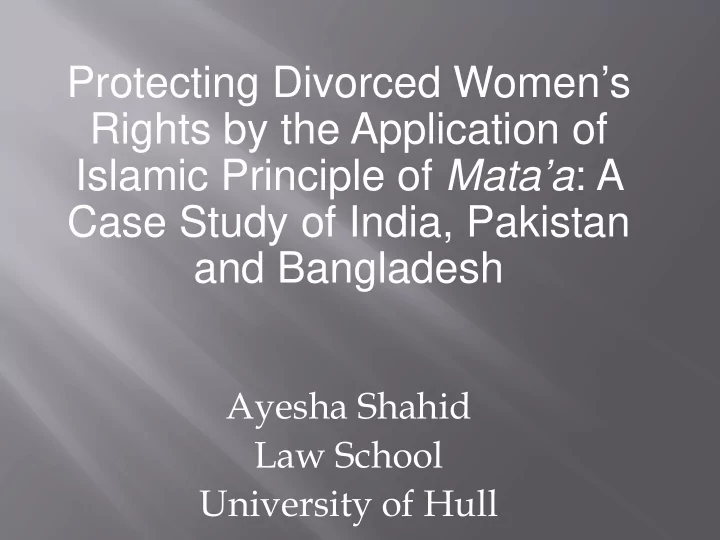

Protecting Divorced Women’s Rights by the Application of Islamic Principle of Mata’a : A Case Study of India, Pakistan and Bangladesh Ayesha Shahid Law School University of Hull
Qur’anic verses 236, 240, 241 in Chapter II and verse 49 in Chapter 33. Qur’anic verse 241 Chapter II “For divorced women maintenance (should be provided) on a reasonable (scale). This is a duty on the righteous.”
Verse 242, Chapter II: “Thus doth God make clear His signs to you: in order that ye may understand”. “ And we have indeed made the Qur’an easy to understand” Verse 121 Chapter II the Qur’an states “ Those to whom We have sent the Book study it as it should be studied; they are the ones that believe therein”
Classical view on Mata’a Sunni Schools of thought Contemporary Islamic Scholars Use of Mashaqah, Darura and Takhayyur
India: Section 488 Criminal Procedure Code later amended and Sections 125-128 CR PC dealt with payment of post-divorce maintenance Shah Bano vs Mohd Ahmad Khan AIR 1985 SC945
Section 3(1)(a) a divorced woman is entitled to “reasonable and fair provision for maintenance after divorce only within the Iddat period. After the expiry of Iddat the husband is not bound to pay maintenance to his wife”.
Constitutional Validity of the Act upheld Wording of the section 3 (1) (a)imposes two distinct duties on the husband; 1) to make a reasonable and fair provision for the divorced wife 2) to provide maintenance for her.
Commission on Marriage and Family Laws Matrimonial Courts should have jurisdiction to order a husband to pay maintenance to his divorced wife for the rest of her life, or till she remarried. “ … a large number of middle aged women who are being divorced without rhyme and reason should not be thrown on the streets without a roof over their heads and without any means of sustaining themselves and their children. Of course it would be open to a matrimonial court to refuse to sanction any maintenance if the woman is at fault ”. Reinterpreting the Shariah “as no progressive legislation is possible if Muslim assemblies remain only interpreters and blind adherents of ancient schools of law” .
P arting gift, consolatory gift or indemnity Provisions of Mata’a are in force in various other Muslim countries Qura’nic revelations are neither time or space limited but universal and eternal ….a need for fresh Ijtehad on current and emergent issue
Responsibility of awarding post-divorce maintenance on the Aulia or the relatives of the wife and in their absence on the state Refused to accept payment of Mata’a after the expiry of Idda t Imposing any such obligation on the husband would be against Shariah.
Column in marriage contract and an amount may be fixed as Mata’a at the time of Nikah. No time limit or period may be specified for Mata’a , and an interim Mata’a may also be awarded Draft bill Muslim Family Law (Amendment)Act 2009
Hafizur Rehman vs Shamsun NaharBegum 4MLR (AD) 1999 Division Bench of the High court by suo motu considered the legal query of whether the divorced wife could claim maintenance beyond the Iddat period. After establishing their jurisdiction to interpret the Quran in light of various Qura’nic verses the court held “maintenance is applicable not only for the Iddat period, but also for the rest of Shamsun Nahar Begum’s life, unless she marries again.”
Decision overruled by the Appellate Division of the Supreme Court of Bangladesh . “Parting gift” falls under the category of a voluntary act, and cannot be judicially enforced. On the basis of section 2 of the Muslim Personal Law ( Shariat ) Application Act, 1937, no change could be made to Muslim Personal law, and the husband was liable to pay maintenance only during the Iddat period.
Judicial activism can bring social change and provide social justice to the vulnerable sections of the society. Mata’a to be interpreted by adopting an inclusive approach which includes looking at the wider Islamic principles of justice, fairness and compassion vis-à-vis constitutional norms and commitments under international human rights treaties.
‘ A comprehensive, well-informed and reasoned exposition of judicial activism and creativity in the interpretation and application of Muslim Family law in South Asia is necessary and important, both in its own right as a social study and as a mean of understanding and addressing the problems arising out of confrontation between traditional and modern values’.
Recommend
More recommend